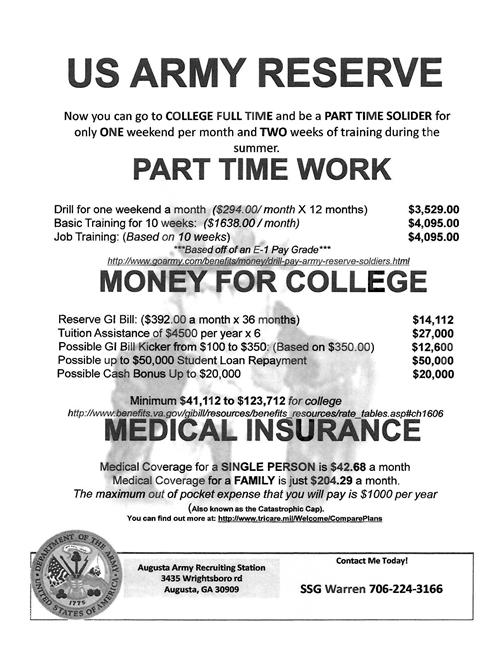Military
Is Army Reserve Worth It

Introduction to the Army Reserve

The Army Reserve is a component of the United States Army that allows citizens to serve their country on a part-time basis. It is an attractive option for individuals who want to serve their country, develop new skills, and earn additional income, but may not be ready to commit to full-time military service. The question of whether the Army Reserve is worth it depends on various factors, including personal goals, financial situation, and career aspirations. In this article, we will explore the benefits and drawbacks of joining the Army Reserve to help you make an informed decision.
Benefits of Joining the Army Reserve

Joining the Army Reserve offers numerous benefits, including: * Education Assistance: The Army Reserve provides education assistance, such as the Montgomery GI Bill, which helps pay for college tuition and fees. * Career Advancement: Serving in the Army Reserve can enhance your career prospects by providing training and experience in a variety of fields, such as medicine, engineering, and communications. * Leadership Opportunities: The Army Reserve offers leadership opportunities, which can help you develop valuable skills and build your confidence. * Travel Opportunities: As a member of the Army Reserve, you may have the opportunity to travel and serve in different parts of the world. * Health Insurance: The Army Reserve provides health insurance, which can be a significant benefit for individuals who may not have access to affordable health insurance otherwise. * Retirement Benefits: Serving in the Army Reserve can also provide retirement benefits, such as a pension and access to veterans’ benefits.
Drawbacks of Joining the Army Reserve

While joining the Army Reserve can be a rewarding experience, there are also some drawbacks to consider: * Time Commitment: Serving in the Army Reserve requires a significant time commitment, including one weekend per month and two weeks per year of training. * Deployment: As a member of the Army Reserve, you may be deployed to serve in combat zones or other areas of conflict, which can be stressful and dangerous. * Impact on Civilian Life: Serving in the Army Reserve can also impact your civilian life, including your relationships, career, and education. * Physical Demands: Serving in the Army Reserve can be physically demanding, requiring you to maintain a high level of physical fitness and endure challenging training and deployment conditions. * Emotional Demands: Serving in the Army Reserve can also be emotionally demanding, requiring you to cope with stress, anxiety, and potentially traumatic experiences.
Who is Eligible to Join the Army Reserve

To be eligible to join the Army Reserve, you must meet certain requirements, including: * Age: You must be between the ages of 17 and 35, although some positions may have different age requirements. * Citizenship: You must be a U.S. citizen or a permanent resident. * Education: You must have a high school diploma or equivalent. * Physical Fitness: You must meet certain physical fitness standards, including passing a physical fitness test and meeting body fat percentage requirements. * Background Check: You must undergo a background check and meet certain moral and character standards.
Types of Jobs in the Army Reserve

The Army Reserve offers a wide range of jobs, known as Military Occupational Specialties (MOS), including: * Combat Arms: Jobs in combat arms include infantry, artillery, and armor. * Combat Support: Jobs in combat support include engineering, signals, and intelligence. * Combat Service Support: Jobs in combat service support include logistics, transportation, and medical careers. * Special Operations: Jobs in special operations include special forces, ranger, and civil affairs.
| MOS | Job Description |
|---|---|
| 11B | Infantryman |
| 13B | Cannon Crewmember |
| 25Q | Multichannel Transmission Systems Operator-Maintainer |

Conclusion and Final Thoughts

In conclusion, joining the Army Reserve can be a rewarding experience that offers numerous benefits, including education assistance, career advancement, and leadership opportunities. However, it also requires a significant time commitment, physical and emotional demands, and potential deployment to combat zones. Ultimately, whether the Army Reserve is worth it depends on your individual circumstances, goals, and priorities. If you are considering joining the Army Reserve, it is essential to weigh the pros and cons carefully and make an informed decision.
What is the time commitment for serving in the Army Reserve?

+
The time commitment for serving in the Army Reserve includes one weekend per month and two weeks per year of training.
Can I choose my job in the Army Reserve?

+
Yes, you can choose your job in the Army Reserve, although the availability of certain jobs may depend on your qualifications and the needs of the Army.
Do I have to deploy to serve in the Army Reserve?

+
Yes, as a member of the Army Reserve, you may be deployed to serve in combat zones or other areas of conflict, although the likelihood of deployment depends on various factors, including your job and the needs of the Army.



